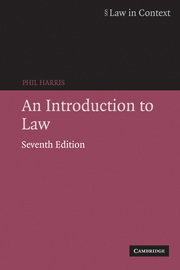Book contents
- Frontmatter
- Contents
- Preface
- Table of statutes
- Table of cases
- 1 Law and society
- 2 Law and morality
- 3 Law and the regulation of economic activity
- 4 Some important legal concepts
- 5 Law and property
- 6 Law and the settlement of disputes
- 7 The making of legal rules
- 8 The European dimension of English law
- 9 Liability in English law: the law of tort
- 10 Liability in English law: crime and the criminal justice system
- 11 The development and the role of the contract
- 12 Law and government
- 13 The legal profession
- 14 The judges
- Index
1 - Law and society
- Frontmatter
- Contents
- Preface
- Table of statutes
- Table of cases
- 1 Law and society
- 2 Law and morality
- 3 Law and the regulation of economic activity
- 4 Some important legal concepts
- 5 Law and property
- 6 Law and the settlement of disputes
- 7 The making of legal rules
- 8 The European dimension of English law
- 9 Liability in English law: the law of tort
- 10 Liability in English law: crime and the criminal justice system
- 11 The development and the role of the contract
- 12 Law and government
- 13 The legal profession
- 14 The judges
- Index
Summary
One of the many ways in which human societies can be distinguished from animal groups is by reference to social rules. We eat and sleep at certain intervals; we work on certain days for certain periods; our behaviour towards others is controlled, directly and indirectly, through moral standards, religious doctrines, social traditions and legal rules. To take one specific example: we may be born with a ‘mating instinct’, but it is through social rules that the attempt is made to channel this ‘instinct’ into the most common socially-sanctioned form of relationship – heterosexual marriage.
Marriage is a good example of the way in which social rules govern our lives. Not only is the monogamous (one man/one woman) marriage supported by the pre-dominant religion in British history – Christianity; it is also maintained through moral rules (hence the traditional idea of unmarried couples living together being ‘wrong’) and by the operation of rules of law which define and control the formalities of the marriage ceremony, lay down who can and who cannot legally marry, specify the circumstances whereby divorce may be obtained, define the rights to matrimonial property upon marital breakdown, and so on.
Marriage is only one example of social behaviour being governed through rules. Legal rules are especially significant in the world of business, with matters such as banking, money, credit and employment all regulated to some extent through law.
- Type
- Chapter
- Information
- An Introduction to Law , pp. 1 - 25Publisher: Cambridge University PressPrint publication year: 2006



